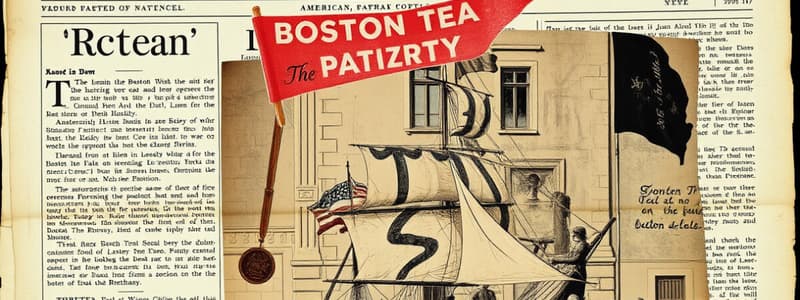Podcast
Questions and Answers
What can we conclude about the author's political ideology based on his description of the Tea Party?
What can we conclude about the author's political ideology based on his description of the Tea Party?
He strongly favored rebellion against the unjust tea tax.
Why does the author begin the article by mentioning how far people had come to expel the Dartmouth from Boston Harbor?
Why does the author begin the article by mentioning how far people had come to expel the Dartmouth from Boston Harbor?
He demonstrated that anti-tea and anti-tax sentiment is widespread.
What is the most likely reason that the governor did not qualify the Dartmouth to return to London?
What is the most likely reason that the governor did not qualify the Dartmouth to return to London?
The governor was bound by his duty to enforce the tea tax on Boston.
Why is it relevant that many other cities followed Boston's example of disobedience?
Why is it relevant that many other cities followed Boston's example of disobedience?
What characteristic of 18th-century coffee-houses does the author's mention reference?
What characteristic of 18th-century coffee-houses does the author's mention reference?
Flashcards are hidden until you start studying
Study Notes
Boston Tea Party Overview
- The Boston Gazette documented the Bostonians’ act of dumping tea into the harbor in protest against British taxation in 1773.
- The event served as a significant act of rebellion, with strong anti-tax sentiment driving the actions of the citizens.
Author's Perspective
- The author's tone indicates a clear favoring of rebellion against what they considered unjust taxation, specifically the tea tax.
- The mention of citizens traveling considerable distances to expel the Dartmouth highlights the widespread anti-tea and anti-tax sentiments among the populace.
Governor's Actions
- The governor’s refusal to allow the Dartmouth to return to London reflects his commitment to enforcing the tea tax in Boston, showcasing the tension between colonial resistance and British authority.
Wider Impact of the Tea Party
- The significance of other cities following Boston's lead in disobedience underscores a growing anti-British sentiment throughout the colonies.
- The Boston Tea Party played a crucial role in galvanizing public opinion against British rule, unifying various colonies in their opposition.
Role of Coffee-Houses
- Coffee-houses in the 18th century served as venues for serious discussions regarding politics and trade, contributing to the political culture of the time.
- The reference to coffee-houses illustrates their importance as centers of civil discourse and political activism.
Studying That Suits You
Use AI to generate personalized quizzes and flashcards to suit your learning preferences.




